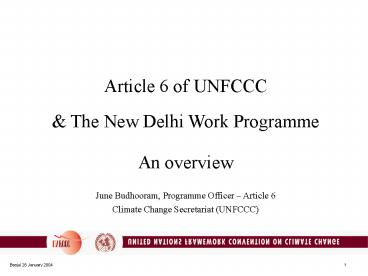Article 6 of UNFCCC - PowerPoint PPT Presentation
1 / 15
Title:
Article 6 of UNFCCC
Description:
June Budhooram, Programme Officer Article 6. Climate Change ... For more on Article 6. Visit us: www.unfccc.int. Contact us: jbudhooram_at_unfccc.int ... – PowerPoint PPT presentation
Number of Views:61
Avg rating:3.0/5.0
Title: Article 6 of UNFCCC
1
Article 6 of UNFCCC The New Delhi Work
Programme An overview
June Budhooram, Programme Officer Article
6 Climate Change Secretariat (UNFCCC)
2
Commitments under Article 4 (i) of the Convention
- All Parties shall promote and cooperate in
education, training and public awareness related
to climate change and encourage the widest
participation in this process, including that of
non-governmental organizations
3
Article 6 of the Convention
4
Article 6 in the negotiations
- Before COP 8 work on Article 6 included
- Submissions of views by Parties
- Organization of workshops and side events to
shape future actions/feedback - Dissemination of scientific information of the
IPCC - Presentation of information in national
communications
5
Article 6 in the negotiations
- Marrakesh Accord November 2001
- Article 6 is an underlying issue for
- Capacity Building in developing countries
- Development and transfer of technology
- GEF and its implementing agencies
- Response strategies in mitigating GHG emissions
adverse effects of climate change
6
New Delhi Work programme
(Decision 11/CP.8)
- Five-year work programme on Article 6
- COP will review the work programme in 2007
- Intermediate review in 2004 at COP 10 to evaluate
its effectiveness - Present in their national communications efforts
to implement their work programme, and serve as
basis for evaluation - All stakeholders involved
7
New Delhi work programme
- Parties must make full use of funding offered by
the Global Environment Facility (GEF), in the
context of existing funding avenues to support
the implementation of the work programme and by
other multilateral and bilateral sources
8
New Delhi Work Programme
- Differences in capacity to implement
- Country-driven approach
- Cost-effectiveness
- A phased approach by integrating Article 6 into
existing climate change progs/strategies - Promotion of partnerships
- Holistic, systematic approach.
9
New Delhi work programme
- Enhance climate focused education and training
programmes - Increase the availability and dissemination of
information on climate change including use of
electronic tools - Improve public understanding and participation in
addressing climate change issues
10
A key element in Parties response
- Generate support to policies and measures
- Strengthen institutional and legal frameworks
- Increase skills and knowledge - Enhance capacity
building - Bridge the gap researchers/policy makers
- Facilitate information exchange
- Promote international cooperation - context of
sustainable development
11
Article 6 InformationNetwork Clearing House
(Proposal contained in FCCC/SBI/2003/4)
- Facilitate the provision of increased access to
information - Focus on the 6 key areas of Article 6
- Based on broad participation
- Database driven specialized web site
12
Reporting by Non-Annex I Parties
- Report activities relating to climate change,
education, training and public awareness (basis
for the periodic review of progress made in the
implementation of Article 6). - Activities also cover public participation,
public access to information and international
cooperation.
13
Reporting by Non-Annex I Parties
- Institutional framework for the implementation of
Article 6 - Level of Awareness and understanding of climate
change issues - Implemented or planned initiatives and programmes
for Education, Training and Public Awareness
14
Reporting by Non-Annex I Parties
- Institutional and/or legal framework for public
participation and access to information - Subregional, regional and international
cooperation to promote Article 6 - Gaps, needs and priorities in climate change
education, training and public awareness
15
For more on Article 6
- Visit us www.unfccc.int
- Contact us jbudhooram_at_unfccc.int


















![United Nations Framework Convention on Climate Change [UNFCCC] PowerPoint PPT Presentation](https://s3.amazonaws.com/images.powershow.com/3960995.th0.jpg?_=20201112108)












